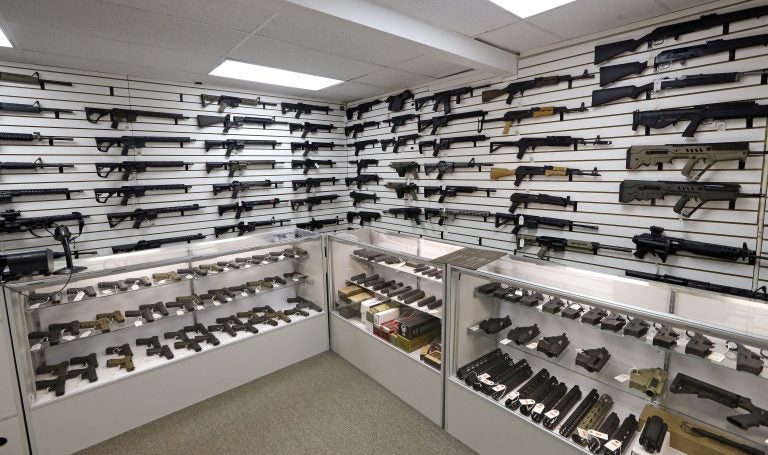To halt some gun sales, cities move to force better Pentagon reports on convictions
Citing case of Texas shooter who killed 26, Philly joins New York and San Francisco in suing U.S. Department of Defense to prevent violent criminals from getting firearms.

Dozens of semi-automatic rifles line a pair of walls in a gun shop Tuesday, Nov. 7, 2017, in Lynnwood, Wash. (AP Photo/Elaine Thompson)
City officials from Philadelphia, New York and San Francisco are suing the Pentagon over its failure to report military convictions to the FBI’s background-check database.
Such lapses, according to the federal lawsuit, could mean dangerous people are more easily getting their hands on firearms.
That kind of blunder was blamed for allowing former Air Force serviceman Devin Kelley to purchase an assault-style rifle from a store before he burst into a church in Sutherland Springs, Texas, last month, killing 25 people, including a pregnant woman.
In 2012, Kelley was sentenced to a year in a military prison and given a bad-conduct discharge following a conviction for assaulting his wife and child.
Yet the conviction was never reported to the FBI’s criminal history database.
The omission provides a window into a two-decade-long systemic problem that even top military officials acknowledge has persisted for too long.
The lawsuit is an effort to force military agencies into compliance with reporting standards to “prevent such senseless carnage from ever again being inflicted by current or former members of the military who should be blocked from acquiring guns or licenses to carry guns,” according to the suit.
Critics counter that had Kelley been unable to purchase a weapon at a gun store, legal loopholes would have allowed him to buy a firearm through a private seller or online without a background check.
But Marcel Pratt, a lawyer with the city of Philadelphia, said in an interview that a court order holding the military accountable for not releasing full information on its former members could still avert future deadly attacks.
If the Department of Defense and the other defendants — including the Air Force, Army and Navy — fail to follow the court’s guidance, assuming the lawsuit is successful, a judge could hold the country’s military agencies in contempt of court.
“The courts are in the unique place to make the Department of Defense do these things because the problem has been known for quite some time, and the other reports and attention brought to it have not remedied it,” Pratt said.
Under federal law, military officials are expected to report serious convictions in military court to the FBI’s background-check database. A dishonorable discharge, such as Kelley’s, is also to be reported. And those with such marks on their records are supposed to be blocked from buying guns.
In Philadelphia, when someone applies for a license to carry a weapon, police department officials comb state and federal databases for past criminal convictions in civilian and military courts. Such a conviction could disqualify an applicant from getting a license.
“And that’s extremely important,” Pratt said. “Nobody should have a permit if they’re not entitled to have one under the law. We think it’s a serious public safety issue, which is why we joined suit.”
According to a report from the Department of Defense’s Inspector General released this month, one-third of all military convictions are not reported to the federal database. Top military officials have testified to the Senate that efforts to fix the problem over the years have proved insufficient.
Officials from the Department of Defense and Justice Department declined to comment.
In a separate pending lawsuit filed two weeks ago, relatives of some of the victims in the Texas church shooting are seeking $25 million in damages from the sporting goods chain Sports & Outdoors over alleged negligence for selling Kelley a AR-556 rifle, the weapon used in the Nov. 5 attack.
WHYY is your source for fact-based, in-depth journalism and information. As a nonprofit organization, we rely on financial support from readers like you. Please give today.





